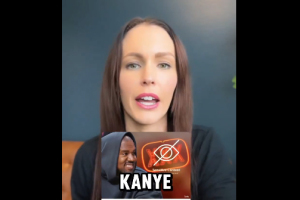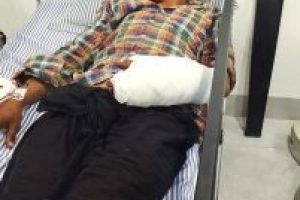Tough Challenges Ahead For Liberia Peace Pact
No-one is hailing the ceasefire agreed in Ghana on Tuesday between Liberian adversaries as the end of that country's civil war. But most people, especially Liberians, are hoping it will achieve a halt in the fighting - a first step along a long road to peace.
The deal follows almost two weeks of halting peace talks in Ghana, whose president currently chairs the Economic Community of West African States (Ecowas).
If the truce holds, then international humanitarian relief workers, who were evacuated from Liberia last week, may feel able to move back into the country. Their return to Liberia would guarantee much needed assistance for thousands of displaced people caught up in the war between government forces loyal to President Charles Taylor and the rebels determined to topple him.
The capital, Monrovia, has seen an influx of tens of thousands of refugees who have fled fighting on the outskirts of the city in recent weeks. They are living in squalid conditions and face dire shortages of food, drinking water and medication.
But there were scenes of rejoicing on the streets of Monrovia, Tuesday, after West African negotiators brokered the peace deal in Ghana. Relieved and jubilant Liberians flocked onto the streets shouting "No more war. We want peace, we want peace." The truce came into effect just after midnight on Tuesday.
Although first reports from Monrovia, Wednesday, said the ceasefire had begun to take hold, with no news of fresh fighting, a spokesman for the rebel group Model (Movement for Democracy in Liberia) claimed that government troops had broken the truce to attack Model positions early Wednesday, just hours after it came into effect. He said Model forces would be ordered to defend themselves.
Major challenges lie ahead for Liberia and those trying to return peace to the country. "The eyes of the world are on you now," declared the former Nigerian military leader-turned-Liberia mediator, Abdulsalami Abubakar, at the signing of the ceasefire in the Ghanaian capital.
Abubakar warned the Taylor government and country's two rebel militias "not to betray their Liberian compatriots" by violating the peace agreement.
On all sides, there were fulsome promises not to break the accord.
"As the government of the republic of Liberia, we will in no way be a part in any further bloodshed in our country," said Daniel Chea, Liberia's Defence Minister. He added: "If we did not learn any lesson from the past, now we will learn. There are no winners in a war, everyone loses. From now it's forward ever, backward never."
Speaking on behalf of the main rebel movement, Liberians United for Reconciliation and Democracy, Kabineh Ja'neh pledged Lurd's commitment. "We want to ensure all of you that we are truly committed to the search for genuine and lasting peace in our country," said Ja'neh. "The people of Liberia will no more resort to arms to resolve our grievances," said Ja'neh as he hugged Chea.
Tia Slanger signed on behalf of the newly emerged rebel militia Model (Movement for Democracy in Liberia) and pledged that they would not to anything to jeopardise the peace.
The accord envisages an immediate ceasefire and says that within 30 days the Liberian government, rebels and political parties should "seek a comprehensive peace agreement." The peace agreement shall, amongst other issues, cover "formation of a transitional government, which will not include the current president."
Will Taylor step down?
The exclusion of Taylor could prove a major obstacle to peace, even though the Liberian leader earlier offered to stand down in the national interest. At the opening of the peace talks in Ghana on 4 June, Taylor announced "If President Taylor is seen as a problem, then I will remove myself. I'm doing this because I'm tired of the people dying. I can no longer see this genocide in Liberia."
That same day, the UN-sponsored Special Court in Sierra Leone made public its indictment of Taylor for war crimes. But the Ghanaian authorities chose not to arrest him and he flew back to Monrovia. Taylor faces prosecution for backing the Revolutionary United Front (RUF) rebels across the border and fuelling Sierra Leone's savage 10-year civil war, gun-running and trading in smuggled "blood" diamonds.
Other neighbouring governments have also accused Taylor of political meddling in their countries and funding rebel militias in both Guinea and Cote d'Ivoire, making the Liberian government something of a pariah and a menace in the region.
Last week, Taylor told journalists in Monrovia that he was still prepared to surrender power, painting a picture of himself as Liberia's sacrificial lamb. "I am prepared to be the fall guy. I'm prepared to be whipping post. I'm prepared to do whatever it takes to bring peace to my people and to stop the atrocities and genocide, by powerful nations, because you hate Charles Taylor. My people must live. They are dying too much. So I will be the sacrifice, for the sake of Liberia."
Taylor has accused neighbouring countries of backing and financing his adversaries and he dismissed rebel demands for his immediate departure, before any peace deal could be reached: "Resigning is just the stroke of the pen. If I resign, who is going to fill the shoe to keep [us from] the massive chaos that could erupt in this country? [If there is] any unceremonious departure from this process, there could be a bloodbath in this process. So let's move the stupidness away from the process. Calling for Taylor to resign? Resign? If I were not here over the past few days, we would not be standing here now".
He told reporters in Monrovia: "Look, I think what the international community needs and wants and what Liberians want, and the West African sub-region, is peace and stability. Charles Taylor sees himself as a valuable part of the process."
That is the message Taylor's officials in Ghana are peddling, that although people may see the Liberian president as the main obstacle to peace, he is also the key to a solution to the conflict in his country. "It's a political discussion, including the issue of the stepping aside of President Taylor. What we were successful in doing in Accra (Ghana) was to separate the ceasefire issue from the political questions," said Taylor spokesman, Vaanii Paasawe.
Observers note that it will probably require Taylor himself to order his troops to lay down their arms.
There was no immediate public comment from Taylor on the peace pact in Ghana, though his radio station announced the ceasefire, but no other details.
And there remains a central condition to Taylor agreeing not to contest elections scheduled later this year, before the end of his six-year term of office in January. The matter of the 'stupidness' he mentioned in his address to journalists has to be sorted out; Taylor warned that he was only prepared to vacate the presidency of Liberia if the war crimes charges were dropped in neighbouring Sierra Leone. "That whole stigma must be removed. How they do it is up to them. But it has to be removed!" he said, with steely determination.
But the indictment stands, says the Special Court. "Whether he's president or not, he's indicted by the Special Court, so he should have his day in court," said David Hecht, spokesman for the tribunal. "It is not possible to withdraw the indictment."
The timing of Taylor's departure and handing over power may become the main hurdle in the Liberian peace process, as well as the war crimes indictment hanging over his head. Taylor is a seasoned and wily political survivor and his taste for power and stranglehold on the leadership of his country will be hard to shake, despite his pledges and promises.
West African peace brokers, the European Union (EU) and the United States - which has close ties with Liberia dating back to independence in 1847, when freed American slaves settled in the new African nation - will have to further negotiate the rocky way ahead, including Taylor's demands that the war crimes charges be dropped. But it may be difficult for him to wish away this headache as neither regional nor international negotiators have jurisdiction over a UN criminal court.
In a communiqu? the EU urged Taylor to "cooperate with the Special Court", saying his indictment "should not impede peace efforts under way in Ghana."
Washington praised the ceasefire accord, saying it looked forward to the creation of an interim government and a return to "true democracy, good governance and prosperity" in Liberia. State Department deputy spokesman, Philip T Reeker, said: "Obviously our hope and goal would be to see a government there based on democratic principles that... can provide a much better life for the people of Liberia."
Reeker said: "We applaud the ceasefire that was signed today. We further applaud the goal of concluding an agreement within 30 days on an interim government that would not include the current president, Mr Taylor."
The State Department spokesman made reference to the suffering of Liberians under Taylor, previously a rebel leader who launched the country's first brutal civil war in 1989. Reeker said those responsible for atrocities in West Africa's wars should be held accountable. Taylor was elected president in a disputed 1997 presidential poll. But he soon faced a counter insurgency in 1999 by Lurd, followed by the more recent appearance of a second rebel militia, Model.
Mohamed Ibn Chambas, the executive secretary of Ecowas, which has been mediating the Liberian conflict, said he hoped to dispatch a 2000-strong "stabilisation force". This would follow monitors of a ceasefire verification mission being sent to Liberia "by the weekend", with logistical support from the United Nations.
Chambas said he hoped governments outside the region would make contributions to the force, which he said would not be "exclusively West African." He said the force could include U.S. and other Western troops, as well as South Africans.
By sarah park
chtoday_za@chtoday.co.za




























